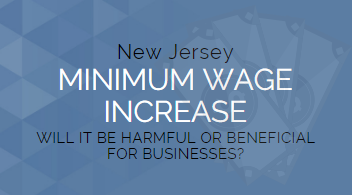
Do you have any hourly employees? Well get ready to pay them at least $15 an hour. Recent legislation increased the New Jersey minimum wage to $15 per hour, about a 70% increase. Many small businesses will feel a crunch due to the increase in wages, but the $15 per hour rate is actually phased in over a period of five years. Starting in 2019, the minimum wage will increase from $8.85 per hour to $15 per hour by 2024.

There are some exceptions to the scheduled increases above. Farm workers, tipped workers, seasonal employees, and employees of small businesses will see the minimum wage increase differently than other workers in the state. Farm workers will have a minimum wage of $12.50 an hour over the same five year period. Tipped workers will have their minimum wage increased from $2.13 an hour to $5.13 an hour by 2024. Seasonal employees and employees of small businesses (defined as businesses with five or fewer workers) will see the $15 an hour by 2026, two years after the rate goes into effect for everyone else. If your employees are not in one of those classes, though, you’ll be raising their wages to $15 by 2024.
Let’s see how this impacts a small business assuming a business has 10 employees all making minimum wage and working full time for 50 weeks of the year. How much extra will it cost the business?

In this scenario the business has increased expenses of about $134,000, or roughly 70%. So is this a bad or a good thing for NJ business owners? Well, that all depends on your business. Many businesses in the state are already paying their employees over $15 per hour, but those that aren’t are clearly going to see a substantial increase in what is already one of the largest expenses for company. Think about it – how would you handle a 70% increase on any of your personal expenses? Like most people, you would try to find ways to cut costs. For businesses that could mean cutting jobs and increasing automation in the workplace.
Legislatures saw this as a potential problem, so they’ve enacted two new tax credits that will offset some of the increased payroll costs. The tax credit is the increased amount of wages and payroll taxes the employer pays as a result of the minimum wage increase. To determine the amount, you have to compare what was paid in the years before the increase to what was paid after the increase took effect.
To learn more about how New Jersey’s minimum wage increase will impact you and your business, contact one of our advisors at Alloy Silverstein.

Associate Partner
Ren III provides tax, accounting, and advisory services to a broad range of clients, with a specialty for manufacturers, title insurance companies, and professional service providers.
View Ren III's Bio → Follow @R3CPA on Twitter →